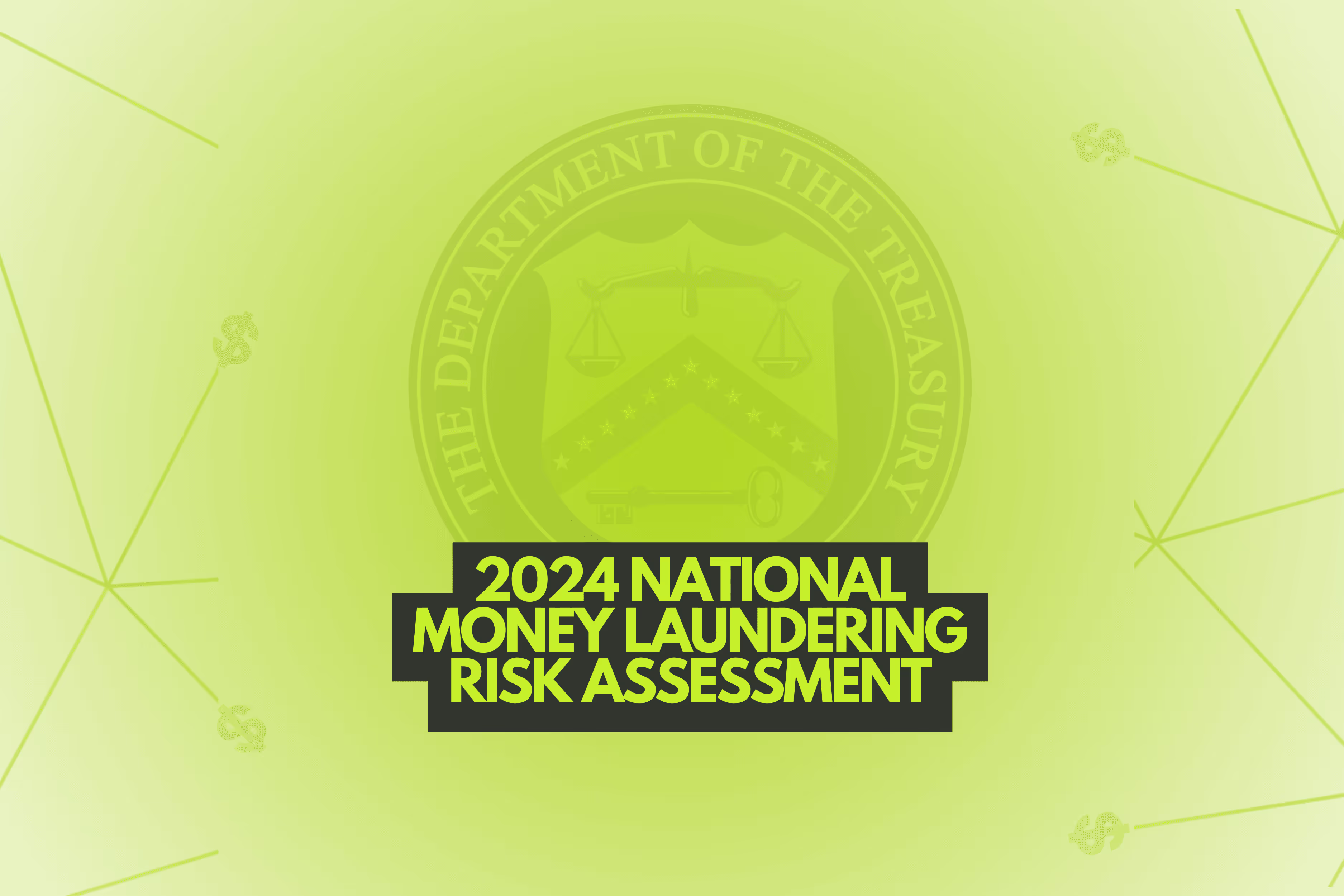
US Money Laundering Risk Assessment: 2024 Update
On February 7, the US Department of the Treasury published its 2024 National Money Laundering Risk Assessment. With more than 100 pages, many of our readers may not have had time to read it. But help is at hand. This sanctions.io article reveals the key takeaways financial crime fighters need to know.
Why the National Money Laundering Risk Assessment Is Important
The US Treasury's National Money Laundering Risk Assessment (NMLRA) is a comprehensive deep dive into current money laundering practices within the US. It's aim? To inform governmental and private sector actors about illicit finance risks and provide guidance.
The Treasury publishes two additional reports focusing on terrorist financing and proliferation financing. To learn more about them, click here.
But back to money laundering. Whether you are in the US or not (with or without operations), staying informed about these assessments is crucial for safeguarding against financial crime worldwide.
Top Tip: The Financial Action Task Force (FATF) recommends all countries publish national money laundering risk assessments. It's advisable to download the relevant reports for your operational jurisdictions.
With no further ado, we will now reveal our key takeaways from the US Treasury's 2024 National Money Laundering Risk Assessment.
Here Are the Threats and Special Focus Snapshots for 2024
At the crux of all NMLRA's is a section known as threats. So what is it? Let's put this into plain English. Money laundering happens when criminals generate illegal funds by committing a crime.
The threats section in NMLRA's cover the primary categories of crimes that produce illegal funds (that are then laundered). The Treasury last published an NMLRA in 2022 - and in 2024, the categories are identical:
Fraud, Drug Trafficking, Cybercrime, Professional Money Laundering, Corruption, and Human Trafficking & Human Smuggling.
Let's now shift attention to the "Special Focus" sections, which are crucial. Why? Because they highlight areas of heightened risk identified during the reporting period that haven't been previously addressed.
Here's what made the list in 2024:
- Check Fraud
- Russian Money Laundering and Sanctions Evasion
- Unlawful Campaign Finance
- Tax Crime
- Decentralized Finance (DeFi)
- Online Gaming (Sports Betting)
Note that the "Special Focus" snapshots do not encompass all the significant takeaways from the assessment. Let's now delve into additional insights from the 2024 NMLRA.
Real Estate and Investment Advisors: AML Regulation Is on Its Way
Many of you will already know this: The Biden administration is pushing for increased transparency in residential real estate transactions in cash sales made upfront. Residential real estate is prevalent in the layering and integration stages of money laundering.
And big news dropped on February 7. Firstly, the 2024 NMLRA revealed that the Treasury’s Financial Crimes Enforcement Network, FinCEN, is drafting regulations to address money laundering vulnerabilities in the residential real estate sector.
Then, in a separate media release a few hours later, FinCEN announced a Notice of Proposed Rulemaking (NPRM) and provided details regarding upcoming AML regulations:
- Proposed rule targets professionals in real estate closings and settlements
- Requires reporting to FinCEN about non-financed residential real estate transfers to legal entities or trusts
- Aims to address high-risk money laundering activities in residential real estate transactions
- Designed to minimize business burden
The Treasury also revealed a 'lack' of comprehensive AML/CFT coverage for investment adviser (IA) industries. And if you are from this sector, you will want to read this:
In the first quarter of 2024, the Treasury will issue an updated NPRM, proposing AML/CFT requirements (under the Bank Secrecy Act), including suspicious activity reporting, for certain investment advisers.
Follow sanctions.io on LinkedIn to keep abreast of the latest developments.
Increasing Concern: Virtual Assets and Digital Peer-to-Peer Payment Systems
Money laundering has traditionally involved fiat currencies. And as sanctions.io reported earlier this year, sterotypical typologies, like stuffing vaccum-packed cash into suitcases, remains common.
Recommended reading: $127 Million Money Laundering Scheme Busted Through Air Miles: 3 AML Takeaways
In its 2024 NMLRA, the Treasury stated that the use of virtual assets for money laundering remains far below that of fiat currency.
But do you know what they also said?
Criminals, scammers and illicit actors (especially in the illegal drugs trade) are increasingly turning to virtual assets and digital peer-to-peer payment systems to engage in fraud and money laundering.
"While the laundering of drug trafficking proceeds is predominantly cash-based, the use of virtual assets is a growing concern for US law enforcement," the Treasury said.
So what should we make this? It's a case of watch this space.
The Treasury announced it plans to release a strategic plan sharing recommendations in the coming weeks - something guaranteed to make waves within the nascent virtual assets industry and the broader AML profession.
Final Thoughts & How To Bolster Your AML Compliance
As mentioned in the introduction, the 2024 NMLRA, spanning over 100 pages, is lengthy. While this article provides a brief overview, it merely scratches the surface. We recommend downloading the PDF (available here) and conducting keyword searches relevant to your operational industries and risk profile.
One firm conclusion, however, is evident: AML regulations are on the way for the real estate and investment advisor (IA) industries.
And this is where we can help.
sanctions.io is a highly reliable and cost-effective solution for AML and sanctions screening. AI-powered and with an enterprise-grade API with 99.99% uptime are reasons why customers globally trust us with their AML screening needs.
To learn more about how our sanctions, PEP, and criminal watchlist screening service can support your organization's compliance program:
We also encourage you to take advantage of our free 7-day trial (no credit card is required).



